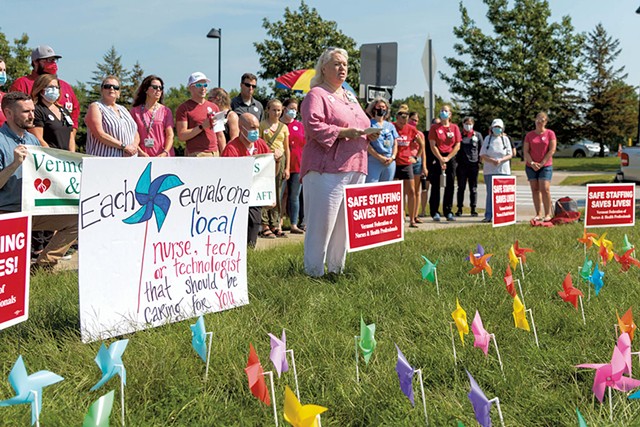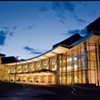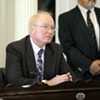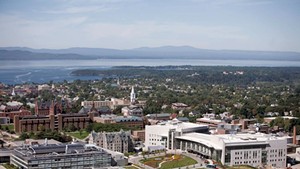Citing Staff Shortage, UVM Med Center Union Questions Surgical Facility Proposal

- Colin Flanders ©️ Seven Days
- Deb Snell, president of the Vermont Federation of Nurses and Health Professionals, speaking last month
The Vermont Federation of Nurses & Health Professionals — which represents 2,400 nurses, technicians and technologists at the UVM Medical Center — wrote to state regulators on Monday questioning the wisdom of expanding the hospital’s surgical capacity at a time when its leaders are “unable and unwilling” to safely staff existing operations.
The Green Mountain Care Board must soon decide whether to allow the Burlington hospital to start developing a plan for the new facility, which officials say would help reduce significant surgical backlogs and meet future demands.
But the union says that unless hospital leaders first commit to addressing existing staffing shortages, then the expansion will only exacerbate the current workforce crisis and further jeopardize the quality of care.
In a letter sent September 10, union president Deb Snell requested that the union be granted “interested-party status” so that it could weigh in on the project before regulators determine whether the hospital can proceed.
“Our members, more than Hospital executives, are undeniably the best voices to weigh in on safe staffing levels for current and future UVMMC patient population and whether this project will serve the public good,” Snell wrote.
Related Care Board Approves UVM Medical Center Rate Hike, Asks for Access 'Crisis' Plan

Care Board Approves UVM Medical Center Rate Hike, Asks for Access 'Crisis' Plan
By Colin Flanders
Off Message
UVM Medical Center president Dr. Stephen Leffler said in a letter to regulators that the new surgical center would replace the hospital's now-shuttered seven-room outpatient facility at Fanny Allen, which was closed last year after a mysterious odor began sickening employees.
The expansion would also help the hospital to modernize, Leffler wrote, referring to a growing trend in medicine to shift surgeries away from more costly inpatient settings toward cheaper and more patient-friendly outpatient spaces.
He said the project is tentatively planned to be built on Tilley Drive in South Burlington, where the hospital already provides some specialty outpatient services, such as cardiology and endocrinology.
Related The Doctor Won’t See You Now: Patients Wait Months for Treatment at Vermont’s Biggest Hospital

The Doctor Won’t See You Now: Patients Wait Months for Treatment at Vermont’s Biggest Hospital
By Colin Flanders and Chelsea Edgar
Health Care
To qualify as an interested party in Vermont's certificate of need process, petitioners must prove that they would be "substantially and directly affected" by a proposal. Snell argued that union employees clear this bar because they are the ones who will be asked to work inside of the center — and will therefore need to overcome any staffing-related challenges associated with it.
With more than 300 union job vacancies, the hospital would have no choice but to run the surgical center with “less than adequate staffing," Snell wrote, raising the chances of errors.
The hospital is currently making up for its staffing shortages by employing an army of travel nurses, who typically come from out-of-state and can make up to four times as much as permanent staff. A spokesperson told Seven Days last month that the hospital expected to spend roughly $40 million on travel employees this fiscal year.
Leffler has said that he hopes to reduce the use of these expensive temporary workers by hiring more permanent staff. But a growing shortage of healthcare workers across the country means that it could take years for this shift to occur.
“This overreliance on travel agencies can represent a waste of health care dollars, while doing little to stabilize safe staffing levels for the long term,” Snell wrote. She asked the care board to approve the union's request and hold a hearing, at which she hoped that the medical center would "make public commitments about its staffing and operational plans."
Related Green Mountain Care Board Joins State Probe of Wait Times for Medical Care

Green Mountain Care Board Joins State Probe of Wait Times for Medical Care
By Colin Flanders
Off Message
Union leaders at the time questioned the hospital’s ability to finance the addition and how that might impact workers’ pay. The Green Mountain Care Board ultimately granted the union “amicus” status, a designation that allowed it to submit materials but prevented it from fully participating in the process — or appealing the final decision.
Regulators may be less receptive to the union’s latest request given that the hospital has only requested permission to begin planning the surgical center, not building it. The hospital would need to obtain a separate certificate of need before it could break ground.
In a statement to Seven Days on Friday, Leffler said that he, like the union, is "critically concerned" with maintaining adequate staffing levels and reducing the hospital's reliance on travel nurses. He stressed that the care board's current review was limited to determining whether the cost of planning for the center was reasonable, and whether the proposed project met an "existing or reasonably anticipated need."
"Our ultimate Certificate of Need application will address staffing, which we are already working hard to address, and we look forward to receiving our employees’ input as part of the process," Leffler said.
Care board chair Kevin Mullin referred a request for comment to Susan Barrett, the board’s executive director, who said it would be inappropriate for regulators to publicly weigh in on a pending issue. The board must issue a decision by September 25.
Related Stories
-

UVM Medical Center Seeks Green Light to Build Surgery Center
By Colin Flanders February 10, 2023
-

State Regulators Approve New Surgical Center — But Restrict Its Offerings
By Colin Flanders March 17, 2022
-

UVM Nurses to Get 20 Percent Raises Over Two Years
By Colin Flanders February 14, 2022
-

Welch and Others Urge Investigation of 'Exorbitant' Travel Nurse Prices
By Colin Flanders January 25, 2022
-

The Doctor Is Out: Why Independent Physicians Are Disappearing From Vermont
By Colin Flanders December 8, 2021





Comments
Comments are closed.
From 2014-2020, Seven Days allowed readers to comment on all stories posted on our website. While we've appreciated the suggestions and insights, right now Seven Days is prioritizing our core mission — producing high-quality, responsible local journalism — over moderating online debates between readers.
To criticize, correct or praise our reporting, please send us a letter to the editor or send us a tip. We’ll check it out and report the results.
Online comments may return when we have better tech tools for managing them. Thanks for reading.